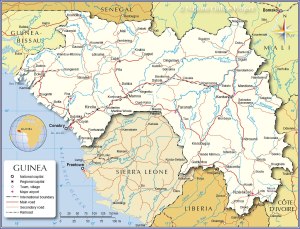For general information about the country profiles click here.
 Population: 13.13 Million
Population: 13.13 Million
HDI ranking: 178/189
HDI score: 0.477
Guinea has historically been a highly centralized country until decentralization was declared for the first time as a state vision in 1985. Decentralization has been pursued reluctantly, and the recent adoption of the Local Government Code and local elections constituted important steps to push local governments to the forefront for encouraging citizen’s engagement and improving service delivery (World Bank, 2008). Military officers launched a coup in September 2021, suspending the constitution and detaining the president. The junta vowed to preside over a return to civilian rule but did not immediately set a date for elections (Freedom House, 2022)
Local governance at a glance
- Guinea has several levels of government administration; in descending order, they are 8 regions, 33 prefectures, over 304 sub-prefectures, and many districts (known as communes, villages, or quartiers) (UNPAN, 2004)(LCA)
- The local authorities are urban municipalities and rural development communities (CRDs). 38 Urban municipalities are subdivided into 342 communes, and in rural areas, the villages are organized into rural districts (SNGWOFI, 2019)
- Local authorities are administered freely by elected councils within the conditions established by law, and the authority’s executive is elected by the local council from among its members (UCLG, 2006).
- Guinea has legislated gender quotas to assure one-third (33%) of the seats for members of district councils are women. Also, political parties which have elected women in the communal-municipal councils can get a 5% distribution of the state funding for political parties (Quota Project, 2013).
Civil society actors include
- The Forum of NGOs for Sustainable Development (FONGDD) is a platform of dialogue gathering national and international NGOs in Guinea. Strategic intervention areas include decentralization and democracy.
Capacity building institutions
- The Association of Presidents of CRDs of Guinea (APCRD/G) and the Association of Mayors of Guinea are associations of local elected officials. They aim to establish a framework of cooperation and exchange to bring socio-economic development to the CRDs and the urban municipalities (UCLG, 2006).
- Ministry of Territorial Administration and Decentralization strengthened the institutional capacities of newly elected officials through providing training/awareness-raising in 2006 (UCLG, 2006).
- National Council of Guinean Civil Society Organizations (CNOSCG) provides information and training for citizens in local languages and strengthens members’ capacities for strategic planning and advocacy (ECDPM, 2003).
Fiscal control
- Local authorities’ resources are their own resources, shared revenues, and grants from the state. Provisions have two types: an operating provision which is annually transferred to all the local authorities and an outfitting provision which appears as a form of subsidy for specific authorities (UCLG, 2006).
- The Local Government Code of 2006 called for autonomy in creating and collecting taxes and setting tax rates for local governments (World Bank, 2008).
- Rural and urban municipalities have a budgetary nomenclature composed of revenues (tax revenues, non-tax revenues, state grants and subsidies, miscellaneous and accidental revenues, and mining sector revenues) and expenditures (SNGWOFI).
- They must prepare, adopt, and have approved annually by the supervisory authority the estimated statement of revenue and expenditure of their local authority. To this end, they have a single budget nomenclature and chart of accounts for the budgetary and accounting management of the local authority.
Key initiatives for participatory local governance
- For the change of regime in 1984, the new authorities stated their desire to have a multi-party democracy and wider citizen participation in the decision-making process (UCLG, 2006).
- In 1986, local authorities were created and the decentralization process effectively began (UCLG, 2006).
- In 2005, elections for rural communities and urban municipalities were organized for the first time (UCLG, 2006).
- The government has committed to decentralization through the adaptation, in 2006, of the Local Government Code which is one of the most comprehensive legal decentralization frameworks in Western Africa (World Bank, 2008).
- In March 2012, the government approved by decree the National Policy Letter on Decentralization and Local Development (LPNDDL) and its action plan. The LPNDDL is a practical instrument of strategic guidance for strengthening decentralization and local development (SNGWOFI).
Challenges for participatory local governance
- There is a certain resistance to decentralization on the level of central State structures because of the fear of a loss of privileges and a lack of confidence in the capability of non-central structures for public service delivery (UCLG, 2006).
- Local governments lack local political, administrative, and technical staff (UCLG, 2006).
- Fiscal devolution is marginal and revenue levels at local governments are insufficient. Moreover, revenue varies significantly among local governments, raising concerns of severe horizontal fiscal imbalance (World Bank, 2008).
- The 2020 Constitution continued to lay out the legislation necessary to and focused on moving decentralization forward. However, the constitution and the Independent National Electoral Commission were both suspended by the military junta that seized power in September 2021, leaving the status of decentralization and the continued divergence of power in flux as the military junta executes its current plan regarding legislation and execution of elections (Freedom House).
Recent posts on this website about this country:
- FAGLAF : Forum d’action pour la gouvernance locale en Afrique francophone (2011)
- Schooling and decentralization : patterns and policy implications in francophone west Africa (2010)
- Local government discretion and accountability : application of a local governance framework (2009)
- Decentralisation and poverty reduction : elaborating the linkages (2000)
List of sources (in order of citation):
UCLG, 2006: “Republic of Guinea”
Freedom House, 2022
Logistics Capacity Assessment, Guinea
World Observatory on Subnational Government Finance and Investment, Guinea
United Nations Public Administration Network (UNPAN), 2004: “Republic of Guinea: Public Administration Country Profile”
Quota Project, 2013: “Guinea”
European Centre for Development Policy Management (ECDPM), 2003: “Non-state actors in Guinea”
World Bank, 2008: “Decentralization in Guinea”
